Hearkening the second trumpet's call in Revelation: explore its profound, enigmatic symbolism and uncover the hidden messages within.
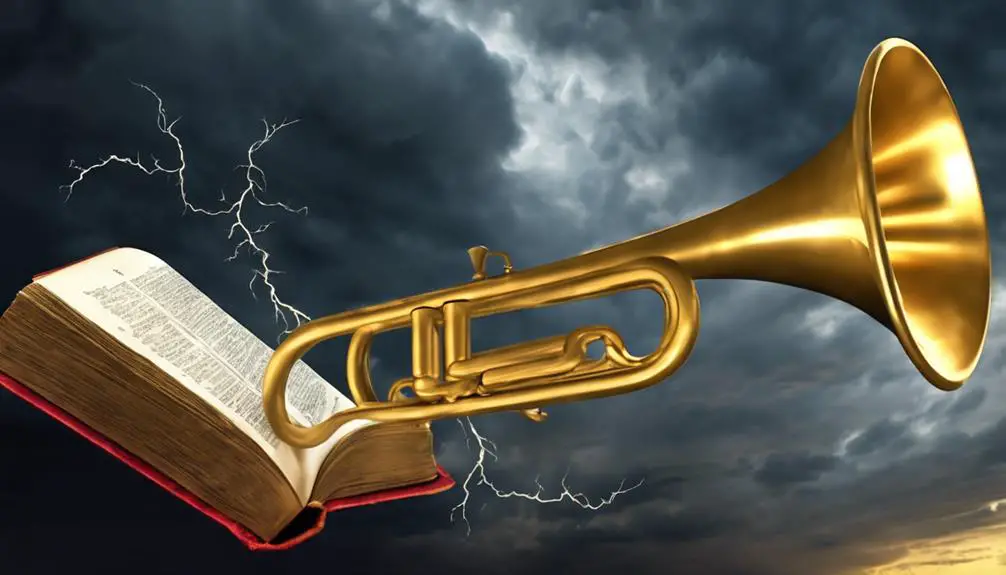
What Is the Second Trumpet in the Bible
You've likely heard of the Seven Trumpets of Revelation, a chilling series of prophetic events penned by the apostle John, but what does the second trumpet specifically signify?
As you navigate through the vivid imagery of Revelation 8:8-9, you'll find the second trumpet ushering in a 'great mountain burning with fire' thrown into the sea. Yet, its symbolism has sparked numerous interpretations throughout history, creating a fascinating web of theories and insights.
Intrigued? Let's explore this further, peeling back the layers of prophecy to reveal the profound message hidden in this celestial call to attention.
Key Takeaways
- The Second Trumpet in Revelation signifies a catastrophic divine judgment, turning a third of the world's seas to blood.
- This trumpet symbolizes divine wrath, spiritual transformation, and echoes Old Testament traditions of God's judgments.
- Interpreted differently among scholars, it serves as a metaphor for moral degradation or a warning about the universality of divine judgment.
- Modern perspectives view the Second Trumpet as a reminder of cosmic disruption or an ecological warning, reflecting contemporary global concerns.
Biblical Context of the Second Trumpet
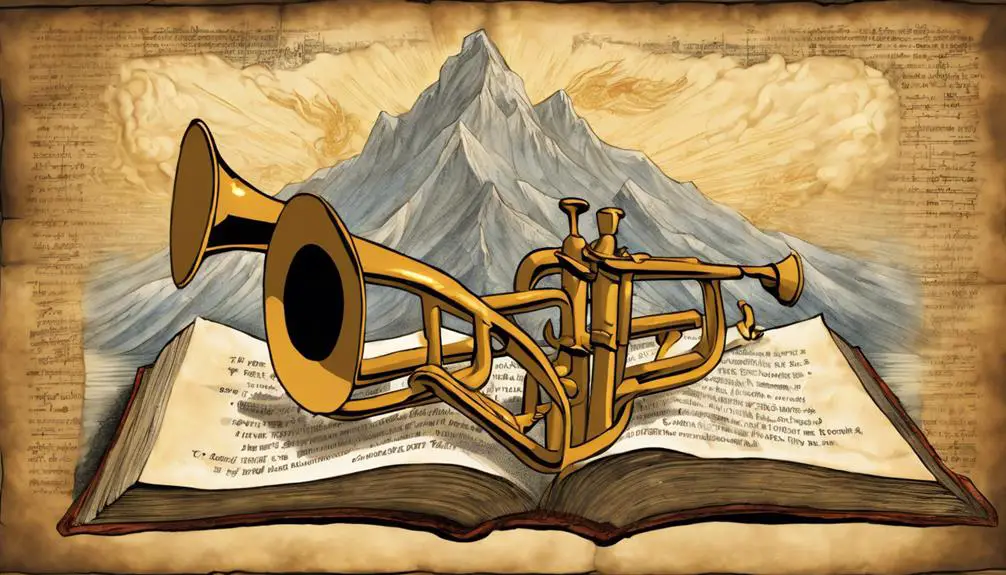
Diving into the Biblical context of the Second Trumpet, you'll discover its symbolic importance in the Book of Revelation's prophetic narrative. The trumpet's origin is rooted in the Jewish tradition, where it was used to announce significant events, and its biblical adaptation carries a similar significance.
The Book of Revelation, laden with apocalyptic imagery, introduces the seven trumpets in the eighth chapter, each heralding a different stage of the impending Apocalypse. Here, the Second Trumpet's role is no less significant than the rest. It signals a catastrophic event, painting a vivid picture of destruction as a third of the world's seas turn to blood, decimating marine life and vessels alike.
While the trumpet's origin provides insight into its function as an announcer, the apocalyptic imagery associated with the Second Trumpet underscores its role as a harbinger of destruction. Its cataclysmic blast isn't just a sound, but a symbol of divine wrath, echoing the Old Testament tradition of God's judgments.
Understanding the biblical context of the Second Trumpet enriches your comprehension of Revelation's complex tapestry, spotlighting its intricate blend of symbolism, prophecy, and apocalyptic anticipation. Armed with this knowledge, you'll be better equipped to navigate the deeper layers of this riveting biblical book.
Unveiling the Second Trumpet's Symbolism
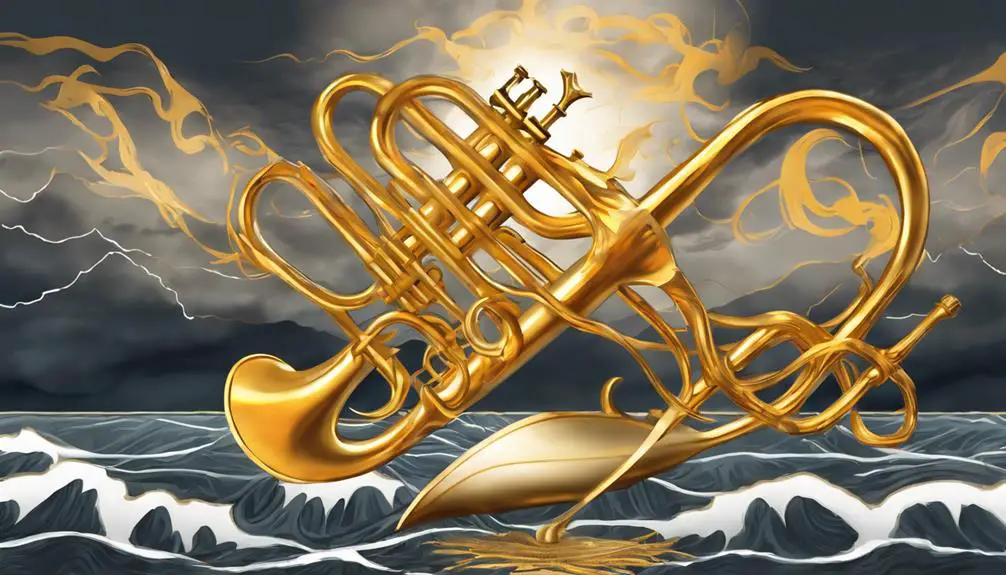
Peeling back the layers of the Second Trumpet's symbolism, you'll uncover a rich tapestry of apocalyptic imagery that holds profound meaning in the biblical narrative. The Trumpet symbolism, inherent in this apocalyptic narrative, is both vivid and nuanced.
The Second Trumpet, as depicted in Revelation 8:8-9, involves a massive mountain of fire thrown into the sea, turning a third of the sea into blood. The imagery here is cataclysmic, suggesting a drastic and divine intervention in the natural order. The mountain, a symbol of stability and permanence, is set ablaze, indicating a transformative process. Fire, in biblical terms, often signifies purification or judgment, further enhancing the apocalyptic undertones.
The sea, typically a symbol of chaos and disorder in biblical literature, is turned into blood. The symbolism here might suggest the perversion of life, as blood often represents life in biblical symbolism. The resultant death of sea creatures and destruction of ships could signify the far-reaching consequences of divine judgment.
In essence, the Second Trumpet's symbolism is an intricate blend of apocalyptic imagery and rich biblical symbolism, serving to convey powerful messages about divine judgment, transformation, and the consequences of spiritual disorder.
Various Interpretations of the Second Trumpet

Now that we've unpacked the rich symbolism of the Second Trumpet, let's turn our attention to the diverse interpretations that scholars and theologians have offered over the centuries. The interpretations are as diverse as they're profound, each shedding a different light on the Trumpet's Relevance to different historical, cultural, and religious contexts.
Many scholars emphasize the Trumpet Metaphors, interpreting the Second Trumpet as a symbol of divine intervention or judgement. This interpretation suggests that the trumpet's sounding heralds God's active involvement in the world, particularly in moments of significant upheaval or change.
Another common interpretation focuses on the destructive imagery associated with the Second Trumpet. Some theologians view this as a metaphor for spiritual or moral degradation, arguing that the trumpet symbolizes the consequences of humanity's deviation from God's path.
Finally, a number of scholars propose that the Second Trumpet underscores the inevitability and universality of divine judgement. They argue that the trumpet's blast serves as a reminder that no individual or nation can escape God's judgement.
These interpretations, while varied, all recognize the critical relevance of the Second Trumpet as a tool for understanding broader biblical themes and narratives.
Implications for Biblical Prophecy Understanding
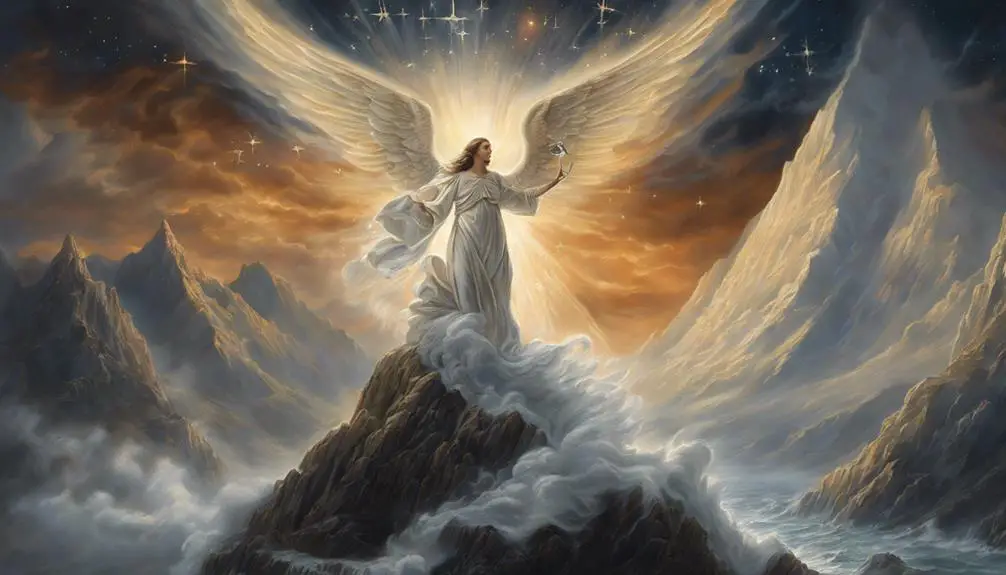
Grasping the implications of the Second Trumpet for Biblical prophecy understanding requires a deep dive into its interplay with other prophetic symbols and narratives in the Bible. This exploration gives you insight into the prophecy validation process and the eschatological implications of Second Trumpet events.
Your understanding of prophecy validation is enhanced when you see how the Second Trumpet aligns with other prophecies. You can't isolate it; it's part of a larger prophetic network in the Bible. It's a piece of a divine puzzle, linking to other prophecies, contributing to the bigger picture of God's plan.
The eschatological implications of the Second Trumpet are profound. They shape your understanding of end-time events, providing a framework for interpreting future prophecies. The Second Trumpet's symbolism, interpreted in light of other biblical prophecies, gives you a glimpse into the nature, sequence, and consequences of end-time events. This not only enriches your understanding of biblical prophecy but also challenges you to live a life of readiness for these prophecies' fulfillment.
Contemporary Perspectives on the Second Trumpet

While you've gained insight into the biblical and eschatological significance of the Second Trumpet, let's turn our focus to how modern scholars and theologians interpret this prophetic symbol. Some contemporary theologians view the Second Trumpet as a sobering reminder of the cosmic disruption that will occur at the end of time. They believe it's not just a historical or future event, but also a symbol of ongoing spiritual warfare.
Modern implications of the Second Trumpet revolve around its role as a warning. For instance, some scholars argue that its significance lies in its capacity to prompt serious reflection on our actions and their potential to contribute to global turmoil. This perspective underscores the necessity for personal and societal transformation.
Furthermore, the Second Trumpet's significance is extended by some modern theologians into an ecological warning. They interpret the Trumpet's destructive impact on the sea and marine life as an urgent call to address environmental degradation. This perspective creates a bridge between ancient prophecy and contemporary environmental concerns.
Thus, the Second Trumpet continues to resonate with contemporary audiences, its meanings expanded and reinterpreted to reflect modern realities and anxieties.
Frequently Asked Questions
What Is the Historical Significance of the Trumpet in Biblical Times?"
In biblical times, trumpet construction and materials held significant roles in ceremonies and rituals. You'd find that trumpets, usually made from ram's horn or silver, were used to announce important events, call people to worship, or signal battle. They symbolized power and divine intervention.
How Does the Symbolism of the Second Trumpet Differ From That of the Other Trumpets in the Bible?"
You're exploring the symbolic associations of the second trumpet in relation to other trumpet interpretations in the Bible.
This trumpet, when sounded, signifies a great mountain burning with fire being thrown into the sea. It's distinguishable from others as it symbolizes significant earthly destruction, affecting both marine life and ships.
This stark imagery differentiates it by conveying a more immediate and tangible sense of devastation.
Are There Any Common Misconceptions About the Second Trumpet in the Bible?"
You might encounter several trumpet misinterpretations in biblical studies. One common misconception is that the second trumpet's symbolism is purely destructive. While it's associated with disaster, it's also symbolic of divine warning and call for repentance.
It's crucial to remember that biblical symbolism is multifaceted, and it's not merely about punishment but also about redemption and transformation.
What Is the Role of the Second Trumpet in the Overall Narrative of the Bible?"
In the biblical narrative, the second trumpet's interpretation is key. It's part of the series of events in Revelation, symbolizing God's judgement. When it's blown, a large burning mountain, embodying biblical imagery, crashes into the sea, turning a third to blood and destroying marine life.
This impactful scene illustrates the severity of divine wrath and sets the stage for further judgments. Your understanding deepens as you explore these vivid symbols and their significance.
How Has the Understanding of the Second Trumpet in the Bible Evolved Over Time?"
You've seen trumpet interpretations and apocalyptic symbolism evolve over time. Initially, the second trumpet's cataclysmic events were taken literally. Now, scholars see it as metaphorical, signifying upheaval in political or social structures.
This shift reflects a broader trend toward understanding biblical apocalyptic literature symbolically. You're part of an ongoing conversation, interpreting these texts within your own historical and cultural context.
Conclusion
In digesting the intricate symbolism of the Second Trumpet, you've explored a vital part of the Biblical prophecy. This understanding enhances your grasp of Biblical eschatology, fostering richer interpretations.
Whether you lean towards literal or symbolic readings, remember, it's a personal journey. Contemporary perspectives add nuanced layers, reflecting the diversity of thought.
In conclusion, the Second Trumpet's significance in the Bible remains crucial, offering a profound compass in navigating prophetic texts.

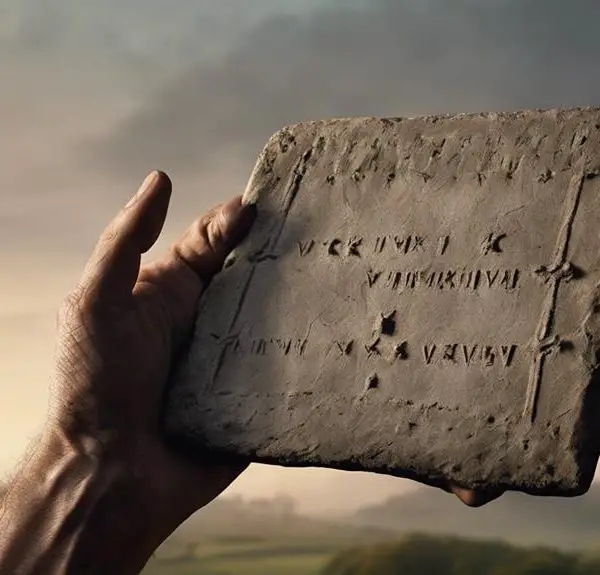
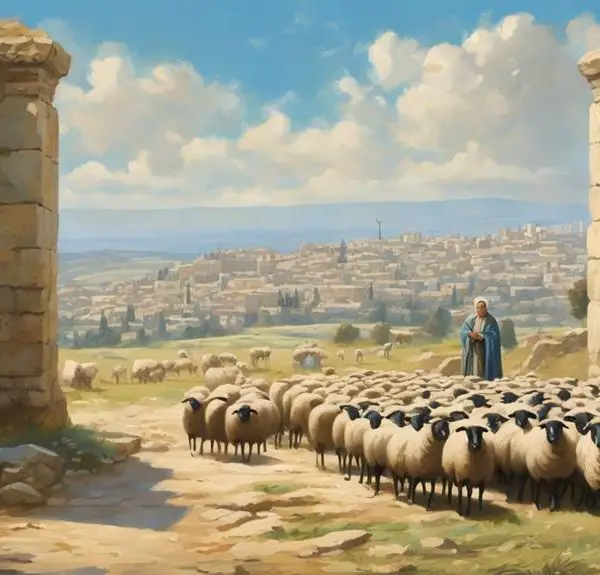
Sign up